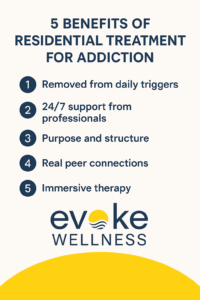Sometimes the hardest part of recovery is simply finding space to breathe. Life doesn’t slow down when you’re struggling with addiction—it piles on. Stress, relationships, bills, triggers, and self-doubt can cloud every step. That’s where residential treatment comes in. It’s not a punishment. It’s a pause. A focused, compassionate reset built entirely around your healing.
Below are five reasons residential treatment for drug addiction doesn’t just help people get clean—it helps them stay clean. For many, it’s the difference between a temporary break and lasting recovery.
1. You’re Removed From Daily Triggers
Addiction doesn’t happen in a vacuum. It’s often tangled in the rhythms of daily life—stressful routines, strained relationships, places that carry painful memories. One of the most powerful benefits of residential treatment is that it lifts you out of that environment.
No more walking past the corner store that used to be your stop after work. No more being surrounded by people who encourage or ignore your use. No more hiding it all while trying to keep things together.
In a residential setting, you have space. Not just physical space—but emotional and mental space, too. You’re no longer constantly scanning for risk or temptation. That clarity makes room for something rare: honest reflection.
2. You Get 24/7 Support—From People Who Get It
Addiction is isolating. Even when people love you, they may not understand what it feels like to crave something that’s hurting you. But in residential treatment, you’re never alone with it.
Round-the-clock support doesn’t mean someone’s hovering. It means help is always close. A therapist who knows how to talk about grief without shaming. A nurse who can help you manage withdrawal safely. A peer who sees your panic and simply nods, because they’ve been there too.
Support becomes your safety net. So when the hard emotions surface—shame, regret, fear, even hope—you’ve got people to hold that weight with you. And that’s when real healing begins.
3. Your Days Have Purpose and Structure
If you’ve been living in the chaos of addiction, you know how easy it is to lose track of time, goals, even yourself. Structure might sound rigid, but in treatment, it’s actually freeing.
A typical day in residential rehab includes therapy sessions, group work, nourishing meals, physical activity, downtime, and check-ins. It’s a rhythm—not a grind. And it gives your nervous system a chance to stabilize.
For many, this is the first time in a long time that days feel predictable, safe, and meaningful. That kind of structure doesn’t just help you heal now—it gives you tools to build a sustainable life once treatment ends.
4. You Build Real Peer Connections
One of the most underrated aspects of a Residential Treatment Program in Massachusetts is the community it creates. Being around others who know the weight of addiction—who’ve sat in the same fear, made similar mistakes, and still show up every day—can be incredibly healing.
These aren’t surface-level connections. They’re real. People share their truth, celebrate small wins, and sit with each other in the hard stuff. That shared vulnerability builds something rare: trust.
In a world where addiction often leads to secrecy and isolation, residential treatment offers connection. And for many, that connection becomes one of the strongest foundations of their recovery.
5. You’re Immersed in Therapy That Actually Works
Recovery isn’t just about stopping substance use—it’s about understanding the pain beneath it. That’s why residential treatment includes more than just detox or daily check-ins. It’s a deep dive into healing.
From evidence-based therapies like CBT and DBT to trauma-focused modalities, expressive therapies, and group sessions, you’re given space to explore what’s really driving your addiction. And you don’t have to rush through it.
This immersion means you’re not just surviving from one craving to the next. You’re rebuilding—your coping skills, your self-understanding, your future. And every part of the program is designed to support that.
It’s Not a Lockdown—It’s a Lifeline
Residential rehab often gets a bad rap. People imagine sterile hallways, strict rules, and a loss of independence. But that’s not what it’s about. A good residential program feels like what it is: a place designed for people to recover with dignity.
You still make choices. You still have a voice. You’re not being locked away—you’re being cared for in a way that’s often impossible in the middle of day-to-day chaos. It’s focused healing, not forced change.
Frequently Asked Questions About Residential Treatment for Drug Addiction
Is residential treatment the same as inpatient rehab?
Yes, these terms are often used interchangeably. Both refer to a live-in setting where individuals receive comprehensive treatment and support for addiction recovery.
How long does residential treatment last?
It depends on the program and your needs. Most stays range from 30 to 90 days, but some individuals may benefit from longer-term care. Your treatment team will work with you to determine the best timeline.
Will I be able to contact my family during treatment?
Yes. Most programs include family therapy or allow scheduled calls and visits. In early days, contact may be limited to help you focus—but family involvement is usually encouraged.
What happens after I leave?
A good residential program includes discharge planning. That might mean transitioning to an outpatient program, sober living, or community-based support. The goal is to set you up with tools and connections that keep you moving forward.
Does insurance cover residential treatment?
In many cases, yes. Coverage depends on your provider and specific policy. Our team can help you verify benefits and understand what’s included. You don’t have to navigate that alone.
Ready to Take the First Step?
You don’t have to do this alone. Call us at (866) 931-6429. We’re here to talk—about your options, your fears, and what recovery could actually look like when you feel supported.





